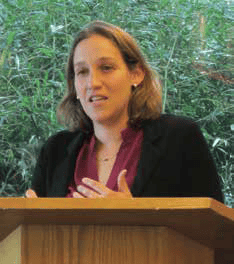Tuesday, November 14, 7:30 pm
Reba and Sam Sandler Family Campus
 Dr. Rachel Fish, Ivy League educator, documentarian, and activist, will discuss her latest book, which she co-edited with Ilan Troen, Essential Israel: Essays for the 21st Century, next month in Tidewater. Her presentation is part of the Israel Today series and the Simon Family JCC’s Lee and Bernard Jaffe* Family Jewish Book Festival.
Dr. Rachel Fish, Ivy League educator, documentarian, and activist, will discuss her latest book, which she co-edited with Ilan Troen, Essential Israel: Essays for the 21st Century, next month in Tidewater. Her presentation is part of the Israel Today series and the Simon Family JCC’s Lee and Bernard Jaffe* Family Jewish Book Festival.
A compilation of essays describing the cultural, political, and historical landscape of Israel, the unique collection in Essential Israel helps answer questions about the country’s complicated makeup.
At 25, Fish was named as one of the the Forward’s 50 most influential American Jewish leader. Currently associate director of the Schusterman Center at Brandeis University, Fish completed her doctoral degree in 2013 in the Near Eastern and Judaic Studies department, also at Brandeis.
The Community Relations Council recently spoke with Fish.
Community Relations Council: What sparked the idea for the compilation of essays?
Fish: I was regularly contacted by a variety of practitioners and people in the field of Jewish communal work who would ask “how do I build a program and have a conversation around Israel?” There’s really no comprehensive volume of material that provides a framework for understanding Israeli history, society, and what it means to be literate about Israel in the 21st century— that’s what propelled us to engage in the process.
Together with Ilan Troen, we wanted to figure out, what does one need to know about Israel in the 21st century? What animated that in the past doesn’t necessarily resonate today with this generation, so we felt we needed to revisit that question. We brought together individuals who are experts in the field in a variety of disciplines to figure out what they needed in order to transmit knowledge to their particular community of learners. We began working with these individuals and asked them to write accessible and digestible essays in their particular areas of expertise—geography, economies of Israel, the histories of the peace process, origins of Zionism, perceptions of Israel on the world stage— and workshopped those essays so that we could create these foundational texts, but ensure that they were written for a broad audience.
CRC: You’ve said that even people who think they know what’s going on in Israel should read Essential Israel. Why?
Fish: The value is that you hear from a multiplicity of voices, not one particular opinion or disciplinarian. They believe in asking questions and want to engage in critical examination of their content, but they’re looking at it with different lenses—from their own experiences—and it influences how they then examine the content of Israel. Also, because this is not a historical, chronological text, it allows people to think in a non-linear way about Israeli history and society, culture, and the particular climate in Israel in relation to the context in which it lives. These chapters can really be read as stand-alone, so it allows people to pick and choose and really open it up from all sides.
CRC: What are some of Israel’s challenges as a Jewish and democratic state in the 21st century?
Fish: Important aspects of Israel’s constitution are that it will be a democracy and also have a Jewish character. When David Ben-Gurion and leaders were establishing the state of Israel, they didn’t imagine that a Jewish character meant a religious character. For them, having a Jewish state did not mean having a halachically bound state, it was not a theological state. This was not a contradiction either—having a Jewish state and a democracy—it felt that they could actually co-exist with one another.
In the 21st century, the tension between those two—particularism and universalism, Jewishness and democracy—is a very real tension. It’s not a new tension, and it’s not unique only to Israel; however, it is a tension that Israel, because it is the only Jewish state, must grapple with and can’t hide from. Those challenges include: What is the role of religious leadership? How does a minority relate to the character of a Jewish state? What does it mean for a minority to hear in the national anthem the yearning for Zion, except they also yearn for a piece of this territory that is not at all referred to as Zion? Those complexities are very real, but don’t have to be a negative. It does mean that Israeli leadership has a responsibility to have serious, meaningful conversation around those challenges because they’re not going away in the 21st century, but rather are more likely to increase over time.
Part Two of this interview will appear in the November 6 edition of Jewish News.
For more information or to RSVP (required) for this free and open to the community event, visit JewishVA.org/IsraelToday.
*of blessed memory
– Wendy Weissman, assistant director CRC
